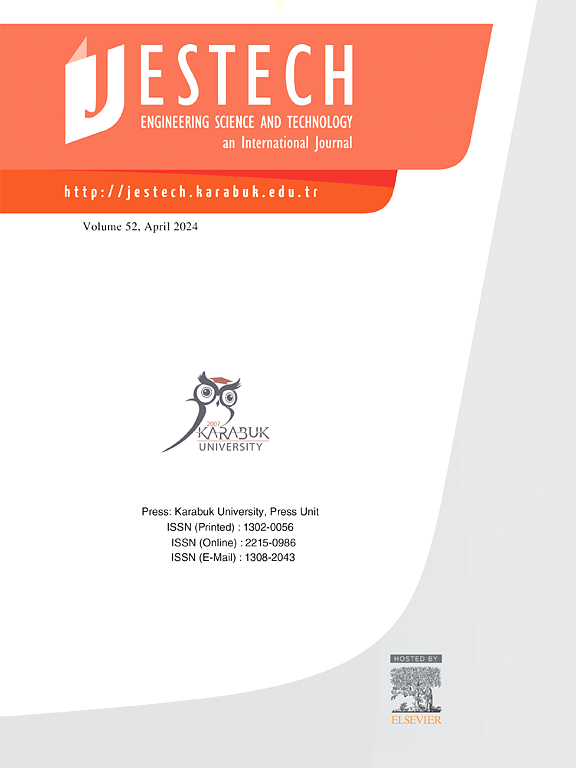基于神经网络的混合磁悬浮系统自适应超扭滑模控制
IF 5.4
2区 工程技术
Q1 ENGINEERING, MULTIDISCIPLINARY
Engineering Science and Technology-An International Journal-Jestech
Pub Date : 2025-08-30
DOI:10.1016/j.jestch.2025.102177
引用次数: 0
摘要
混合磁悬浮系统与纯电磁悬浮系统相比,由于永磁体的引入,混合磁悬浮系统对参数的不确定性和外界干扰更加敏感。传统的控制策略已不能满足混合悬浮系统的运行要求。为了解决这一问题,设计了一种基于神经网络的自适应超扭滑模控制器来处理未知参数和外部干扰。首先,本文分析了永磁体的引入对系统可控性和安全性的影响。设计了一种自适应滑模控制器。为了解决模型参数的不确定性问题,采用神经网络对未知量进行拟合。然后,为了进一步解决平台在面对扰动时的抖振问题,在神经网络控制器的基础上开发设计了自适应超扭控制器。最后,在混合悬浮实验平台上进行了相关实验验证。实验结果表明,所提出的控制策略能够在外界干扰下保持平台稳定悬浮,保证系统的气隙跟踪和悬浮安全。本文章由计算机程序翻译,如有差异,请以英文原文为准。
Neural network-based adaptive super-twisting sliding mode control for hybrid magnetic levitation system with external disturbance
Hybrid magnetic levitation system compared with pure electromagnetic levitation system, because of the introduction of permanent magnets, the hybrid levitation system is more sensitive to parameter uncertainty and external disturbance. The traditional control strategy is unable to meet the operational requirements of the hybrid levitation system. To solve this problem, an adaptive super-twisting sliding mode controller based on a neural network is designed to address unknown parameters and external disturbance. Firstly, this study analyses the impact of the introduction of permanent magnets on the controllability and safety of the system. An adaptive sliding mode controller is designed. To address the issue of model parameter uncertainty, a neural network is employed to fit the unknown quantities. Then, to further solve the chattering issue on the platform in the face of disturbances, an adaptive super-twisting controller was developed and designed based on the neural network controller. Finally, related experimental verification was carried out on a hybrid levitation experimental platform. The experimental results indicate that the proposed control strategy is able to maintain stable levitation of the platform even under external disturbance and ensure the airgap tracking and levitation safety of the system.
求助全文
通过发布文献求助,成功后即可免费获取论文全文。
去求助
来源期刊

Engineering Science and Technology-An International Journal-Jestech
Materials Science-Electronic, Optical and Magnetic Materials
CiteScore
11.20
自引率
3.50%
发文量
153
审稿时长
22 days
期刊介绍:
Engineering Science and Technology, an International Journal (JESTECH) (formerly Technology), a peer-reviewed quarterly engineering journal, publishes both theoretical and experimental high quality papers of permanent interest, not previously published in journals, in the field of engineering and applied science which aims to promote the theory and practice of technology and engineering. In addition to peer-reviewed original research papers, the Editorial Board welcomes original research reports, state-of-the-art reviews and communications in the broadly defined field of engineering science and technology.
The scope of JESTECH includes a wide spectrum of subjects including:
-Electrical/Electronics and Computer Engineering (Biomedical Engineering and Instrumentation; Coding, Cryptography, and Information Protection; Communications, Networks, Mobile Computing and Distributed Systems; Compilers and Operating Systems; Computer Architecture, Parallel Processing, and Dependability; Computer Vision and Robotics; Control Theory; Electromagnetic Waves, Microwave Techniques and Antennas; Embedded Systems; Integrated Circuits, VLSI Design, Testing, and CAD; Microelectromechanical Systems; Microelectronics, and Electronic Devices and Circuits; Power, Energy and Energy Conversion Systems; Signal, Image, and Speech Processing)
-Mechanical and Civil Engineering (Automotive Technologies; Biomechanics; Construction Materials; Design and Manufacturing; Dynamics and Control; Energy Generation, Utilization, Conversion, and Storage; Fluid Mechanics and Hydraulics; Heat and Mass Transfer; Micro-Nano Sciences; Renewable and Sustainable Energy Technologies; Robotics and Mechatronics; Solid Mechanics and Structure; Thermal Sciences)
-Metallurgical and Materials Engineering (Advanced Materials Science; Biomaterials; Ceramic and Inorgnanic Materials; Electronic-Magnetic Materials; Energy and Environment; Materials Characterizastion; Metallurgy; Polymers and Nanocomposites)
 求助内容:
求助内容: 应助结果提醒方式:
应助结果提醒方式:


